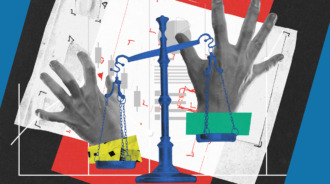

The first year is a challenge for every trader. Did you know that 80% of newbies give up during the first twelve months? This isn’t because they aren’t interested in trading anymore. In most cases, it’s a result of wrong decisions and a loss of confidence.
However, it’s possible to overcome first-year difficulties and move forward in your trading path. Keep reading to learn the five most effective practices that will help you stay afloat in the trading world.
1. Don’t take big risks at the beginning
A common rule all trading tutorials include is to develop a plan and stick to it. Most traders skip it, but it’s the first thing you must set. A plan includes specific steps on when to enter and exit the market and how much risk to take. It should be developed through demos and small trades. Unfortunately, you won’t create an effective strategy on demo trades only.
After you have a plan, stick to it until you open over 100 trades. Only after that can you open larger positions and test risky approaches, including scalping or trading on highly volatile markets.
At the same time, risks should be taken step by step. If you want to trade with scalping strategies, start with one and learn how the market behaves on low timeframes. Later, you can move to another approach.
2. Don’t regret your decisions
Many traders quit in their first year because they regret losses. Losses are an essential part of any investing activity. You should be ready for them before you decide to open your first trade.
The idea is not to regret but to learn from your mistakes. Write down the data of every trade you open. For instance, you can take notes about what signal you used to open and close a trade, the position size, how much risk you took, and what the market conditions were when you entered the market.
Remember that you should put less than 1% of your trading balance into a trade. A 1% loss won’t make you struggle and blame yourself for wrong decisions.
3. Practice
You won’t be able to succeed if you don’t practice. If you expect to make a fortune after the first trade, you won’t become a professional trader. Only your own mistakes will teach you and build your professional skills.
Use a demo account or open small trades to feel the market. Try different approaches, and develop your own methods but trade only free funds. Free funds are those you don’t need for necessary things like food, accommodation, and clothes.

4. Explore the market at this particular moment
Although there are some assumptions about how the market is supposed to behave in certain conditions, the market is a live organism that changes. Those rules that worked before may fail. For example, Bitcoin is supposed to decline when the Federal Reserve raises the interest rate. However, in recent months, BTC’s reaction was the opposite.
You shouldn’t expect or assume something. You should follow the market and analyze it at this particular moment. Never go against the market — you will always lose.
5. Don’t compare yourselves to others
The worst thing that affects individuals, regardless of the sphere of their lives, is comparing themselves to others. It also relates to trading. If some of your friends, colleagues, or family members trade, don’t ask about their results, and don’t tell them about your success rate.
Everyone is unique and must develop their own approach. Today you failed, but this mistake may teach you something important that will help you in future trades.
Summing up
You can definitely survive the first year of trading if you stay calm, follow the rules, use your funds wisely, and do everything step-by-step. Remember that learning and practicing are vital things you must do as often as possible.








